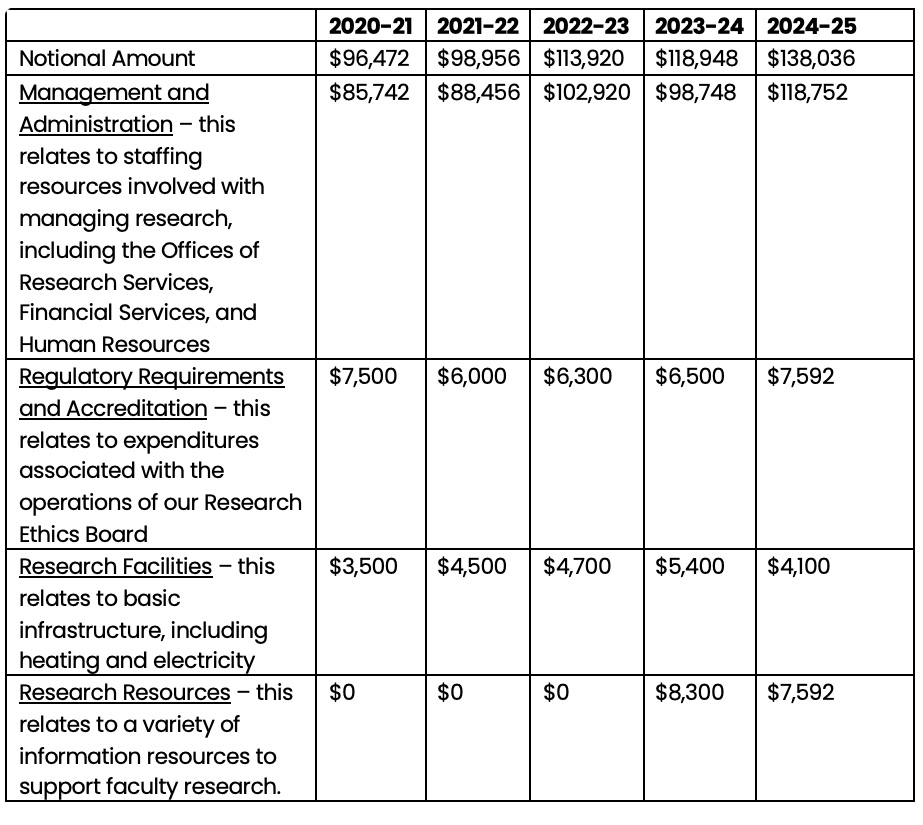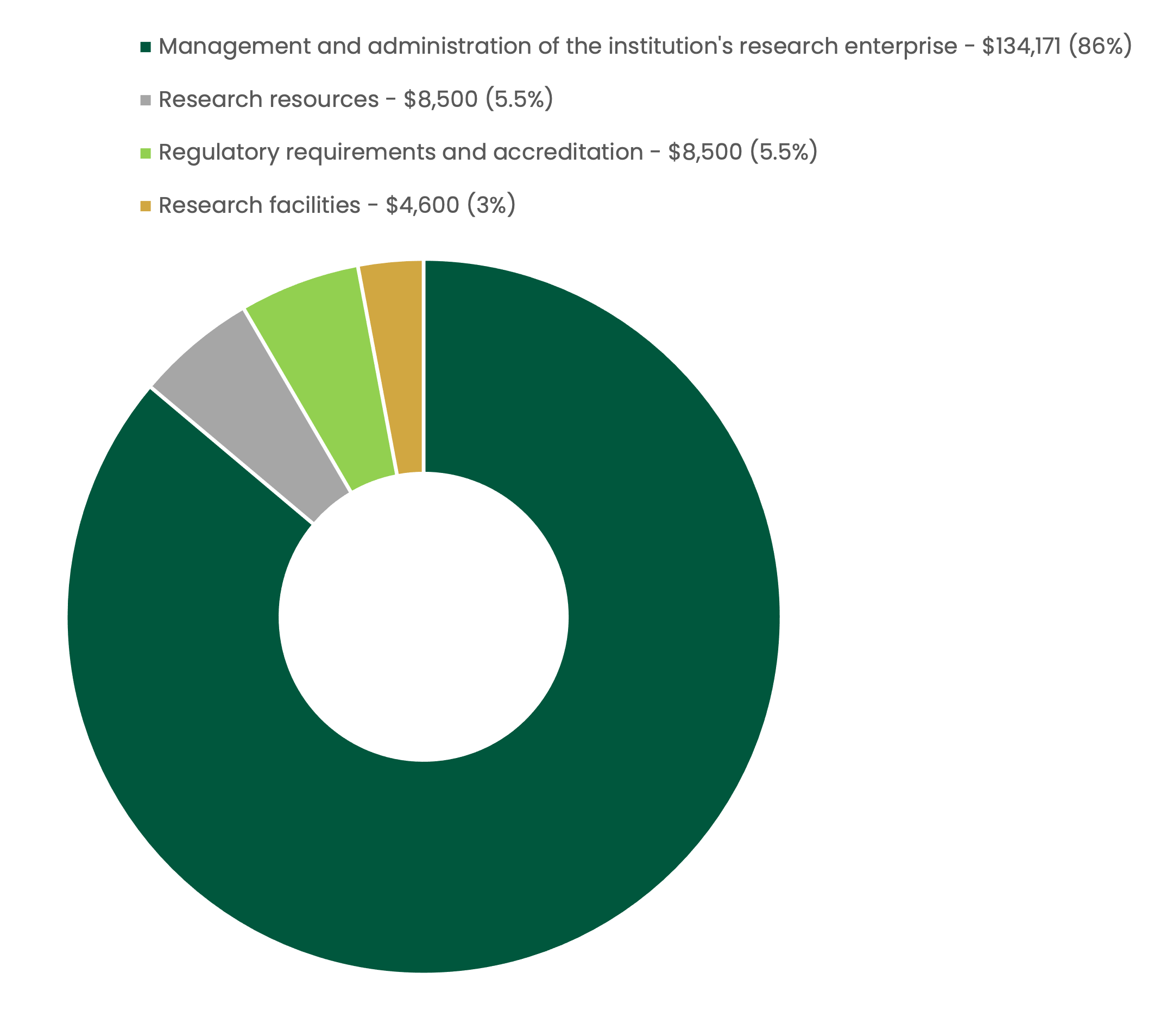The Research Support Fund (formerly known as the Indirect Costs Program) helps Canadian postsecondary institutions to manage their research enterprises by investing in project-related and infrastructural supports that are required for Tri-Agency-funded research activities to take place. Funds allotted under the program are used to alleviate the financial burden of basic and yet relevant expenses which indirectly accrue to institutions as a result of research. By supporting research 'indirectly' the program ultimately helps researchers and universities to concentrate on cutting-edge discoveries and scholarship excellence in Canadian universities without bearing 100% of the indirect costs associated with such work.
The term “indirect costs” refers to the day-to-day requirements that enable the research enterprise to take place, as basic infrastructure and human resources underpin research success. The administration of research requires administrative staff to provide support and oversight, grant management, and financial management; basic infrastructure like heat, electricity, computer and network maintenance, and other facilities are essential for supporting research activities. There are also costs associated with meeting a variety of regulatory requirements, including research ethics, open access, and research data management.
Each year, St. Thomas University receives a grant from the federal funding agencies (SSHRC, NSERC, and CIHR) through the Research Support Fund to offset these costs, based on a formula calculated in relation to research funding received. Historically, STU has used its RSF funding as follows:

For the 2025-26 year, St. Thomas University proposes to use our allocation under the Research Support Fund, totalling $155,771, as follows:

St. Thomas University’s communications strategy for the RSF will help to bring awareness to the importance of the program in supporting our research community, and the Canadian research environment more generally. The STU Office of Research Services will:
- Publicly acknowledge the RSF and its impact to the university community through a variety of communications throughout the academic year;
- Maintain our RSF website;
- Ensure that research supported by the RSF is duly acknowledged;
- Educate new faculty members about the RSF and its uses at STU;
- When discussing Tri-Council funding with researchers, we explain how the annual dollar value of Tri-Council grants awarded to our institution dictates how our RSF grants are calculated. This serves as an additional motivation for our faculty to submit external grant applications and helps them to recognize the role that the federal government plays in supporting their research endeavours;
- STU ORS staff are also involved in both online and in-person conversations about RSF grant best practices, specifically at CARA National.
Investment Story
The Tri-Agency RSF helps provide for staff in the Office of Research Services (ORS) so that the office can support the nurturing of student and faculty talent. For example, on Thursday and Friday, August 29 and 30, 2024 just before the beginning of Fall 2024 academic term the Office of Research Services held its first annual Research Office Workshop to inform and train faculty regarding a number of issues: how the RSF is used at STU, Research Data Management, Research Security, Grant Management, Research Ethics (Responsible Conduct of Research) and the requirements of Open Access. This was a two-day event with morning and afternoon sessions. Throughout the academic year – Fall & Winter 2024-2025 – we followed up with grant writing workshops as well as information and reminders to faculty about internal and external research funding, awards and guidelines via email bulletins.
On the afternoon of Friday, October 11, 2024 the ORS held a Graduate School and Scholarship information session for students. This was a form of “Nurturing Talent”. One of the main topics was on applying for Canada Graduate Scholarships - Masters funding. We prepared a Powerpoint to help with this event. For many students this was their first encounter with terms such as the Tri-Agency, SSHRC and NSERC, etc.
In late 2024 and early 2025 the Associate V-P (Research) worked with the Senate Research Committee to prepare a new Strategic Research Plan (2025-30) for the university, and RSF support for the AVP(R) position directly supported this achievement. The new plan was published in Spring 2025.
Our research office staff accesses RSF funds to travel to conferences and workshops for training. In November, 2024, for example, the AVP(R) attended the SSHRC Leaders meetings in Ottawa. The benefits of such training helps the Office of Research Services run more efficiently and share its knowledge with faculty and members of the administration at the university.
St. Thomas University allocates its RSF grant through a consultative process involving the Associate Vice-President (Research), the Vice-President (Finance), the Vice-President (Academic & Research), and the Comptroller. Together with the President's Advisory Committee on the Budget, an annual plan is developed according to the overall university budget, taking into consideration specific needs that arise from year to year. The Research Support Fund continues to be of immense benefit to supporting the research enterprise in our university.
For more information on the Research Support Fund, please visit: http://www.rsf-fsr.gc.ca/home-accueil-eng.aspx
-(2).jpg)